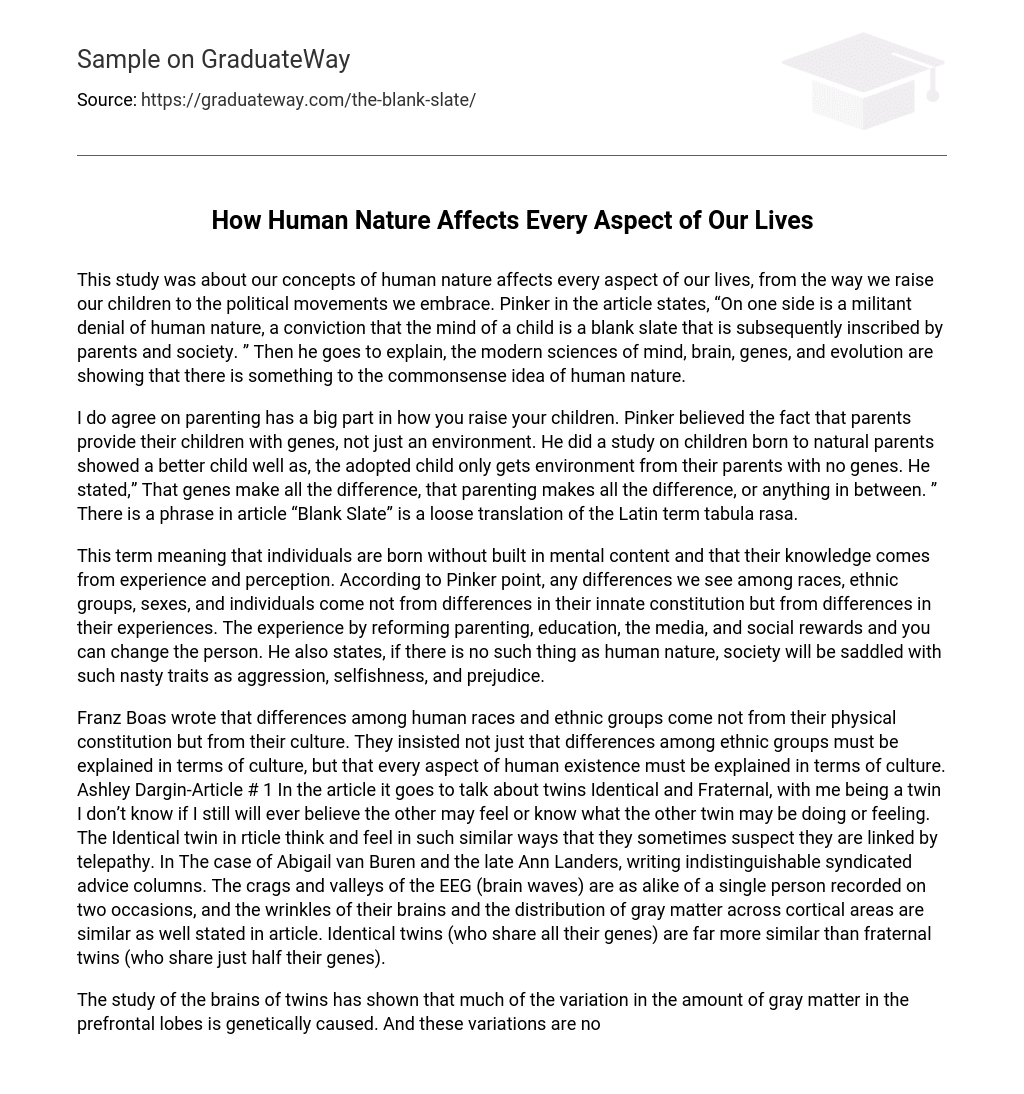In this study, it was found that our understanding of human nature has a significant impact on various aspects of our lives, covering everything from child-rearing practices to the political ideologies we adopt. Pinker argues that some people vehemently deny the existence of human nature, believing that a child’s mind is completely blank and gets shaped solely by their upbringing and societal influences. However, Pinker asserts that the advances in the scientific fields of mind, brain, genetics, and evolution provide evidence supporting the notion that there is indeed an inherent human nature underlying our behaviors.
Pinker suggests that parenting plays a significant role in child upbringing and agrees that parents provide not only an environment but also genes to their children. A study comparing children born to natural parents and adopted children found that those with biological parents showed better child development due to the presence of both genetic and environmental factors. Pinker argues that the impact of genes and parenting can range from being the sole determinant to having equal importance. The term “Blank Slate,” mentioned in the article, loosely translates to the Latin phrase tabula rasa.
The concept of this term is that individuals are born without inherent mental content, and their knowledge develops through experiences and perceptions. According to Pinker, variations observed in races, ethnic groups, sexes, and individuals do not arise from innate characteristics but emerge from diverse experiences. By modifying parenting, education, the media, and social rewards, one can alter an individual. Pinker further asserts that if human nature does not exist, society will be burdened with negative qualities such as aggression, selfishness, and prejudice.
According to Franz Boas, the differences between human races and ethnic groups stem from their culture rather than their physical constitution. He emphasized that not only should differences among ethnic groups be explained in terms of culture, but every aspect of human existence should be as well. In an article discussing twins, it is mentioned that Identical twins sometimes suspect they have a telepathic connection due to their similar thoughts and feelings. This similarity can also be seen in cases like Abigail van Buren and the late Ann Landers, who wrote indistinguishable syndicated advice columns. The article states that the EEG brain waves, brain wrinkles, and distribution of gray matter are also similar in identical twins, who share all their genes, compared to fraternal twins, who only share half of their genes.
The examination of twin’s brains has revealed that genetic factors are responsible for a large portion of the differences in gray matter quantity within the prefrontal lobes. These variations are not arbitrary anatomical discrepancies like fingerprints; rather, they demonstrate a strong correlation with differences in intelligence. The belief in the blank slate concept was believed to support notions of equality and societal progress, thus it is not unexpected that the findings challenging this concept have frequently been met with feelings of trepidation and animosity.
One fear revolves around inequality. If we are all equal, then there is concern that not embracing our individual differences could lead to discrimination, oppression, or eugenics. Despite variances in IQ or physical ability, humans share common traits. Another fear relates to the enduring desire for the possibility of perfecting humanity.
According to this belief, if humans always have inherent flaws and commit sins that lead to death, any efforts for social reform would be futile. Parents frequently find that their children are unaffected by the incentives, punishments, and persistent reminders they provide. In the grand scheme of things, a child’s personality and intelligence are primarily influenced by genetics, peer groups, and random occurrences. Princeton University philosopher Peter Singer has demonstrated that moral progress has occurred throughout history as people have broadened the mental connection to include more entities deserving of compassion.





